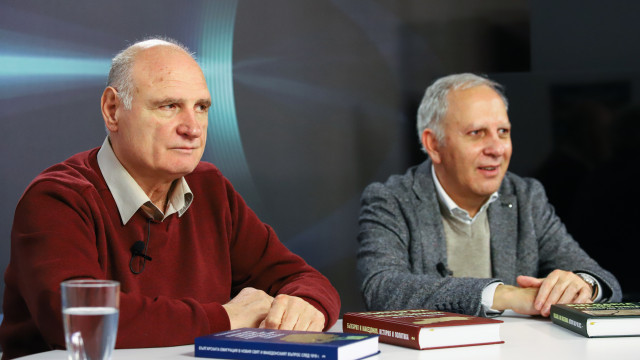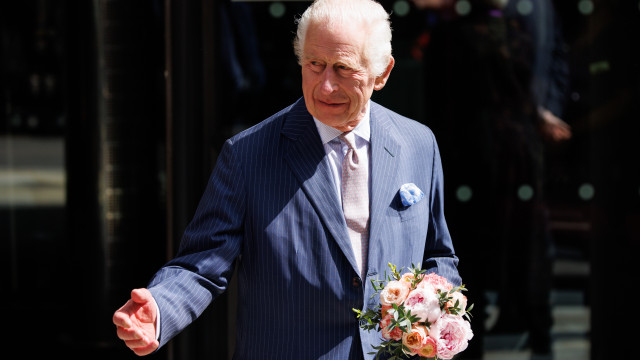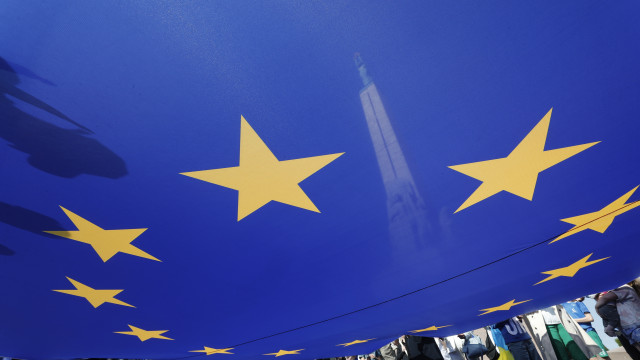For 150 years the blow of Belgrade against all prominent Bulgarians has been falling with incredible weight in Macedonia. The genesis of Macedonism was outside Skopje, and the first carriers of this project were Serbian scholars. Debulgarization began from the first moment when Serbian troops entered Macedonia during the First Balkan War.
This was stated in an interview with BGNES by prof. Daniel Vachkov, director of the Institute for Historical Research at the Bulgarian Academy of Sciences (BAS), and Dimitar Dimitrov, under whose leadership the book "Bulgaria and Macedonia, History and Politics" in two volumes was published.
The scientific work, in which prof. Vachkov is a co-author, is the first of its kind because it is translated into English. It is extremely accessible to societies and politicians in the European Union, the United States and other countries, making the Bulgarian position clear to our partners. The writing involves 40 authors with 43 topics, which are based on scientific facts about the Middle Ages, the Ottoman period, wars, the struggle for the rights and freedoms of the population in Macedonia and the emergence of the Macedonian language.
"This work is a kind of scientific monograph, in which the knotty topics such as Macedonism, the Comintern, the Bulgarian Orthodox Church, are a unified position of the author team," Dimitrov said.
Prof. Vachkov noted that in a very convincing way, on the basis of indisputable, authentic sources, the common history that Bulgaria and Macedonia have is seen.
Part of the work deals with the period in which Bulgaria rebuilt itself after the Berlin Congress. While the Bulgarians of Mysia and Thrace had the opportunity to develop and build their modern state, the question of achieving national liberation remained for the Macedonian Bulgarians.
"The second volume is dedicated to the painful processes after the Balkan Wars (1912-1913), when a huge part of the Bulgarian people remained outside the boundaries of free Bulgaria, under the rule of the Serbian and Greek regimes," the scholar said.
"Here we see the genesis of those processes, from which we are still reaping the bitter fruits. It begins with the cruel policy of de-Bulgarization and assimilation of these areas and their Bulgarian population. In the years between the two world wars, the first sprouts of the theory that would later become a state ideology - Macedonism, subsequently pushed by the Comintern and Yugoslavism", Daniel Vachkov said.
The professor emphasized that the genesis of the ideology was outside Skopje: "Macedonism is not a project of the local intellectuals, who can definitely be defined as people with Bulgarian identity."
The first bearers of this project are Serbian scholars, who face an extremely complex problem. The original Serbian thesis was that the population in Macedonia was Serbian (made Serbs). Very soon it becomes clear that this will not work.
"At the beginning of the 20th century, the thesis developed that this population had not developed a national consciousness - an amorphous mass on which, if worked hard and purposefully, the goals of the relevant factor could be achieved. The thesis "you are neither Bulgarians nor Serbs, but something else - Macedonians" turns out to be more promising. The left movements along the lines of the Comintern later began to launch the "Macedonian nation" hard. This option is extremely convenient for the future Serbian nationalism, which is disguised behind Yugoslavism", explained the director of the Institute for Historical Studies.
"This book shows how the persecution of the Bulgarian nation began from the first moment Serbian troops entered Macedonia, when we were allies, while the Balkan war was still going on and the Bulgarian army was fighting heavy battles on the main Odrin front. After a victory at Kumanovo, the Serbs advanced into Vardar Macedonia without serious resistance from Turkish troops. Immediately they began to subject all the bearers of Bulgarian national identity - the spiritual and cultural elite - to cruel persecution," he added.
After the First World War and the Treaty of Neuilly, the Serbs returned to this cruel policy. They banned the use of the Bulgarian language in public, even Bulgarian songs. Bulgarian refugee organisations wrote petitions to the League of Nations detailing the extreme cruelty.
On the Bloody Christmas of 1945, the blow against all prominent Bulgarians in Macedonia again came down with incredible severity. Yugoslavia after the Second World War realised Serbian grand chauvinist ambitions.
"The policy of constant repression and the creation of a fictitious sense of equality with the other peoples of Yugoslavia followed. This was demonstrated by the monstrous break-up of Yugoslavia - it was not a normal federation," said Prof. Vachkov.
"Unfortunately, contemporary Macedonianism is also filled with a lot of Southern nostalgia. My colleagues in the Historical Commission, most of them started their development in the Yugoslav era and remember with great fondness the time when they were part of a "very nice peaceful Yugoslavia", he added.
After 1945, the Yugoslav Communist Party harshly persecuted all opponents of Macedonianism as a state ideology. Bulgarians were sent to the most horrible camps. This included the communist structures in Skopje, subordinated to Belgrade. The communist authorities in Bulgaria also contributed to what was happening in the first years, starting a process of outright debulgarisation of the Pirin region. It was not until the late 1960s that the entry of "Macedonian" in the passports of the local population stopped.
The publisher Dimitar Dimitrov noted that the work will reach all the world's libraries, thanks to the National Library "St. Cyril and Methodius. On the international book exchange, it is distributed in all countries of the European Union, the USA, plus Belgrade, Skopje, Moscow and other non-EU countries. /BGNES







